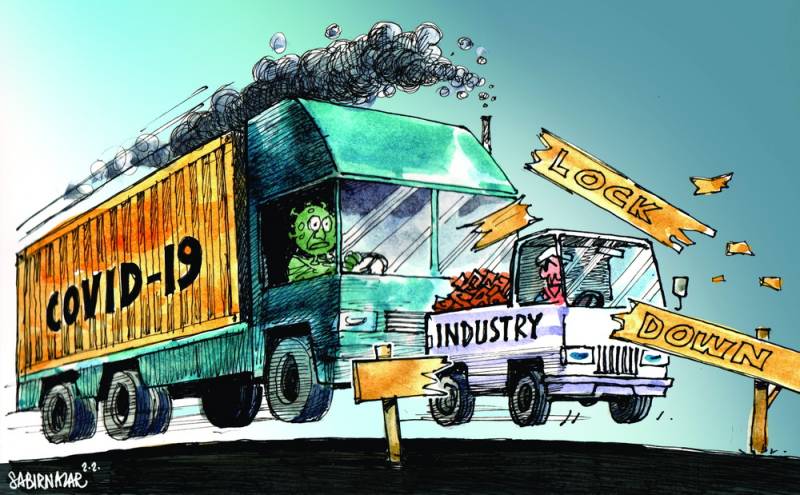

The policy confusion in Islamabad is now exacting another toll. First, it was whether or not Pakistan should go to the IMF, with Asad Umar saying no and then Hafeez Sheikh saying yes. Then it was whether or not we should privatise state enterprises, with Asad Umar saying no, yes, maybe and Hafeez Sheikh putting many units on the block but doing nothing about it. Meanwhile, PM Imran Khan has made a virtue out of U- Turns as the hallmark of great leadership. His COVID-19 “Lockdown” policy beats them all: now we have a lockdown, now we don’t; now Islamabad and the provinces are locked into a consensual policy, now each province is free to make its own policies, now the ulema have agreed to abide by the rules, now they are striking out on their own; and so on, ad infinitum.
Despite global best practices, from Day-One Imran Khan was against a “lockdown” policy for two reasons: his government didn’t have the money or the means to pay millions of households “below the poverty line” whose breadwinners would be out of jobs during the lockdown; and he couldn’t afford to choke the economy when it was already drowning in a sea of debt. So he clutched at straws to justify his view: the “official” Pakistan data showed that COVID-19 wasn’t taking dangerous exponential leaps; the “evidence” (1-2 per cent fatalities) suggested that infected people, especially the young, could easily fight off the virus; the hot summer would take the sting out of it; there was every chance that a vaccine would be developed in the near future to save us all. For two months the virus germinated and spread among the populace. It couldn’t be monitored because a sufficient number of testing kits or protective gear for doctors were unavailable. Mr Khan hemmed and hawed, wringing his hands and feebly trying to fend off a rising chorus of pro-lockdown media and opposition critics.
Last week, Imran Khan finally seemed to give in, juggling the budget to marshal a new “relief package” of a couple of hundred billion rupees for the jobless during a half-hearted, uneven lockdown that mocks the very notion of “lockdown” and makes nonsense of economic-revival policy. Interprovincial travel is banned, intercity isn’t; any business enterprise with “labour” may remain open – which means all manufacturing units and many retail shops – but self-operated small general merchant shops (which most need to stay afloat) may not; the construction industry – supplier of housing – may get special incentives and not disclose the source of its investment (black money) but the buyer of housing (demand for housing) is left out in the cold; tailors and bookshops may open but cloth merchants, schools, printers and publishers who are recipients of their services are locked down; it is all right for most to get back to “business as usual” behind the fig leaf of a “lockdown”. Meanwhile, the moral factor at the heart of his decision remains unspoken: it is ok to keep the economy going even as tens of thousands of Pakistanis could die in the “bargain”!

Worse, at a time when the nation desperately needs a leader who can inspire and unify the people behind one solid policy decision, there is bitter discord between Islamabad and Sindh and between the ruling PTI and the combined opposition parties whose leaders are being relentlessly hounded. The personalized “attack” on the Sindh Chief Minister, Murad Ali Shah, who has earned popular kudos for his heartfelt handling of the crisis in his province, by the usual pack of PTI louts, is particularly jarring. In fact, the PM has now jumped into the fray and tried to hog the limelight in Sindh as the “true” benefactor of the people. Even a national health crisis is not reason enough to stop such petty politicking!
A strong body of expert opinion holds contrary views. It is argued that the true extent of the COVID-19 infection is grossly underreported: people with symptoms are either not reporting them because of cultural factors or because they are not life threatening enough or because they are being denied hospitalization because of lack of testing kits and trained doctors. People who are dying at home because of the infection are being quietly buried and not registered as virus victims. Despite this, the curve is acquiring threatening proportions as the months collapse into weeks and weeks into days, suggesting that we are on the cusp of an explosion.
US President Donald Trump and UK PM Boris Johnson have demonstrated much the same policy inclinations as Imran Khan. Mr Trump thought the virus could be stopped in its tracks by a combination of international travel restrictions and untested vaccines, but he was so wrong that the US is now the most dangerously infected nation on earth. Mr Johnson nearly died in an ICU before abandoning his “herd immunity” policy and following other European nations in locking down the country.
For the sake of Pakistan, we hope Imran Khan’s gambit will succeed, otherwise there will be hell to pay.

